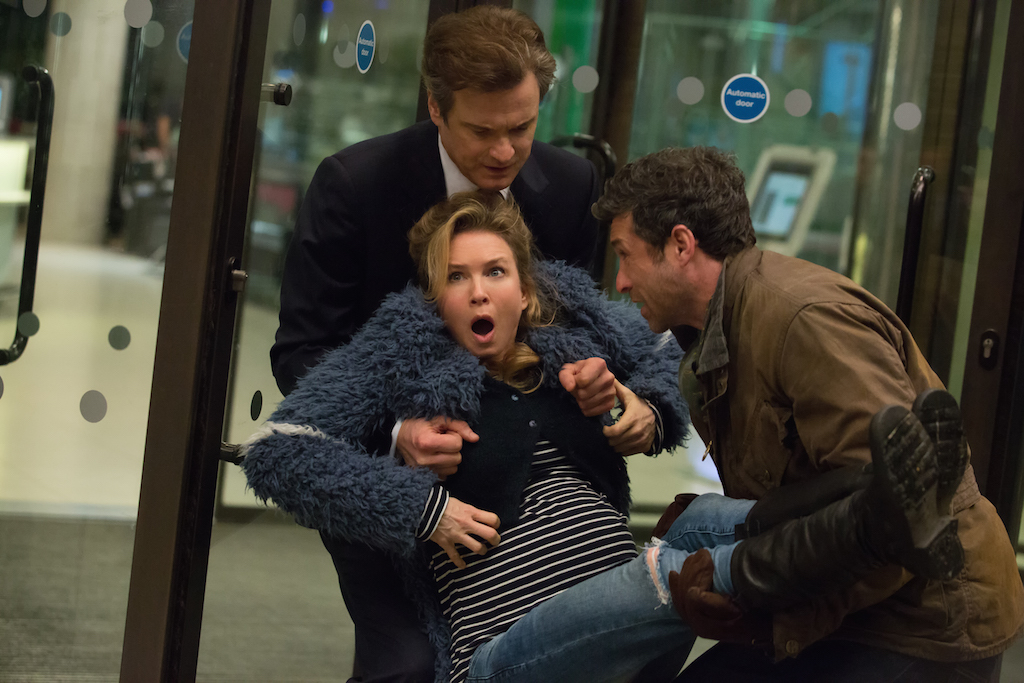
Believe it or not, it’s been 15 years since Bridget Jones’s Diary first hit screens (I’ll pause to let you all reflect on your encroaching decrepitude…). My general rule of thumb when it comes to sequels is this: beware of ones that come out more than a decade after the original—they’re usually just a shameless money grab for all involved. (For recent evidence, see the dreadful Zoolander sequel and the mediocre My Big Fat Greek Wedding reboot.)
On the other hand, it’s not like the 2004 sequel, Bridget Jones: The Edge of Reason was any good, and people seemed to like that one just fine. It’s possible that the socially awkward, unlucky in love, daffily optimistic Bridget is one of those characters people simply want to revisit, even when she’s essentially doing the same thing over and over again—like a rom-com James Bond.
But can people handle a middle-aged Bridget?
There was a controversial article recently in Variety about Renee Zellweger’s alleged cosmetic surgery and how her new face was potentially ruinous to the series because—sacre bleu!—she no longer looks like dear old Bridg. Putting aside the inherent sexism of that article (Hollywood puts enormous pressure on women to stay eternally young; then chastises them when they dare to get some work done), it’s simply not true. Honestly, Zellweger looks great, certainly as good as (still dashing) Colin Firth, who plays her eternally on-again-off-again love interest, Mark Darcy. Yes, she and the rest of the cast do look older, but that’s a thing people do in real life—they age.
(And let’s just take a moment to appreciate the fact that this is a film about a middle aged woman with two AGE APPROPRIATE suitors. Lo, the angels have heeded my call.)
As this one starts, Bridget is celebrating her 43rd birthday alone—again. She and Mark Darcy are officially off (in fact, he’s remarried) and all of her friends have kids or are otherwise too busy to celebrate with her. But she’s not in a total funk—she’s at her “goal weight” (I have a hunch this is because Zellweger wasn’t keen on gaining 30 pounds for the part again) and has a great job as a producer of a PM news chat show. This installment doesn’t have Hugh Grant—his Daniel Cleaver was on a plane that crashed, with the passengers presumed dead—but since all Bridget Jones films seem to require a love triangle, we get Patrick Dempsey as Jack Qwant, a handsome entrepreneur who made billions off a dating app.
She meets Jack at a Coachella-like music festival that she was dragged to by her friend Miranda (Sarah Solemani). Naturally, after arriving at the festival, Bridget falls face-first into a pile of mud (while wearing all white) and has to be gallantly rescued by Jack. Later, she inadvertently stumbles into Jack’s tent at night, gets disrobed on his bed, and the two end up having sex. A couple of weeks later, she and Mark hook up a friend’s baby christening (only after Mark announces that he’s divorcing his wife). Shortly thereafter—surprise!—she finds out she’s having what her OB-GYN (Emma Thompson) indelicately calls a “geriatric pregnancy.”
After much Bridget-like dithering, she gets Jack and Mark together at a restaurant to explain that either one of them could be the father. Both men are desperate to be the dad, but all parties agree that, until the baby is born and a DNA sample procured, the most important thing is the health of Bridget and the child. From there, it’s bit of a pissing contest between Jack and Mark, with Jack being the charming alpha male and Mark brooding and glowering in that patented Darcy way. (Colin Firth may be the only actor ever to have played both a literary character and a rom-com character inspired by that literary character.)
It’s not totally surprising that Bridget Jones’s Baby feels a little passé. When the first one came out, there was no Tinder, no iPhones, no YouTube, and—more importantly— no real pushback against the kind of movies that present marriage and childbirth as a women’s ultimate goal. The attempts to make this one relevant feel a little forced: At the station where Bridget works, a bunch hipsters with ironic facial hair and an obsession with internet clicks (millennials, amirite?) have taken over; and at the music festival there’s an Ed Sheeran cameo that goes on way too long.
Bridget’s parents (Gemma Jones and Jim Broadbent) are back, but they are relegated to the sidelines (indeed, Ed Sheeran nearly gets more screentime). Same for Bridget’s gang of boisterous besties, who appear only briefly. I suppose this makes sense—they have families now and real-world commitments—but their absence leaves a bit of a hole. Part of the fantasy wish-fulfillment of Bridget Jones films is that, while the men in her life may come and go (and come again), her warm, loving, and supportive friends are her real family.
Still, the film is fun enough—a graying simulacrum of the original, no better or worse than the second one. Thompson does some reliably funny work as the droll obstetrician, who just tries to roll with the punches of Bridget’s chaotic private life. Zellweger is still relatable and appealing as Bridget. The prat-falls are still silly, the diary musings still self-deprecating, and the bumpy roads still leads to true love—for now at least.
In short, Bridget Jones’s Baby is not a great Bridget Jones movie, but it is a Bridget Jones movie, and maybe that’s all people need.
